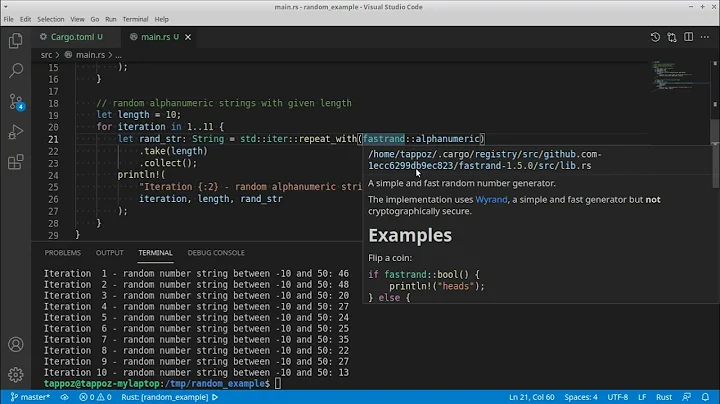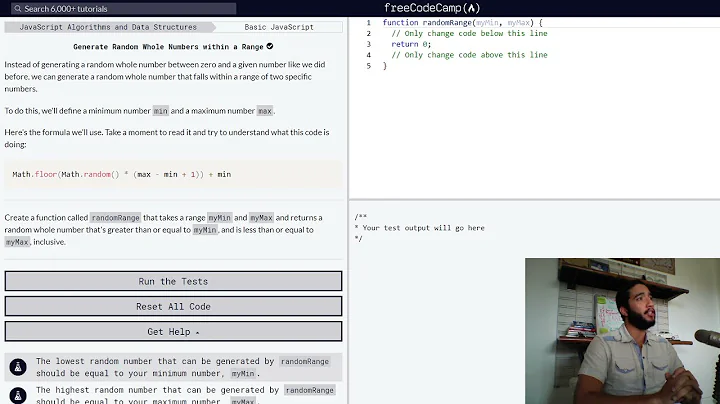How can I generate a random number within a range in Rust?
Solution 1
Editor's note: This answer is for a version of Rust prior to 1.0 and is not valid in Rust 1.0. See Manoel Stilpen's answer instead.
This has been changing a lot recently (sorry! it's all been me), and in Rust 0.8 it was called gen_integer_range (note the /0.8/ rather than /master/ in the URL, if you are using 0.8 you need to be reading those docs).
A word of warning: .gen_integer_range was entirely incorrect in many ways, the new .gen_range doesn't have incorrectness problems.
Code for master (where .gen_range works fine):
use std::rand::{task_rng, Rng};
fn main() {
// a number from [-40.0, 13000.0)
let num: f64 = task_rng().gen_range(-40.0, 1.3e4);
println!("{}", num);
}
Solution 2
This generates a random number between 0 (inclusive) and 100 (exclusive) using Rng::gen_range:
use rand::Rng; // 0.8.0
fn main() {
// Generate random number in the range [0, 99]
let num = rand::thread_rng().gen_range(0..100);
println!("{}", num);
}
Don't forget to add the rand dependency to Cargo.toml:
[dependencies]
rand = "0.8"
Solution 3
The documentation for Rng::gen_range states:
This function is optimised for the case that only a single sample is made from the given range. See also the
Uniformdistribution type which may be faster if sampling from the same range repeatedly.
Uniform can be used to generate a single value:
use rand::distributions::{Distribution, Uniform}; // 0.6.5
fn main() {
let step = Uniform::new(0, 50);
let mut rng = rand::thread_rng();
let choice = step.sample(&mut rng);
println!("{}", choice);
}
Or to generate an iterator of values:
use rand::distributions::{Distribution, Uniform}; // 0.6.5
fn main() {
let step = Uniform::new(0, 50);
let mut rng = rand::thread_rng();
let choices: Vec<_> = step.sample_iter(&mut rng).take(10).collect();
println!("{:?}", choices);
}
Related videos on Youtube
Comments
-
Brian Oh almost 2 years
Editor's note: This code example is from a version of Rust prior to 1.0 and is not syntactically valid Rust 1.0 code. Updated versions of this code produce different errors, but the answers still contain valuable information.
I came across the following example of how to generate a random number using Rust, but it doesn't appear to work. The example doesn't show which version of Rust it applies to, so perhaps it is out-of-date, or perhaps I got something wrong.
// http://static.rust-lang.org/doc/master/std/rand/trait.Rng.html use std::rand; use std::rand::Rng; fn main() { let mut rng = rand::task_rng(); let n: uint = rng.gen_range(0u, 10); println!("{}", n); let m: float = rng.gen_range(-40.0, 1.3e5); println!("{}", m); }When I attempt to compile this, the following error results:
test_rand002.rs:6:17: 6:39 error: type `@mut std::rand::IsaacRng` does not implement any method in scope named `gen_range` test_rand002.rs:6 let n: uint = rng.gen_range(0u, 10); ^~~~~~~~~~~~~~~~~~~~~~ test_rand002.rs:8:18: 8:46 error: type `@mut std::rand::IsaacRng` does not implement any method in scope named `gen_range` test_rand002.rs:8 let m: float = rng.gen_range(-40.0, 1.3e5); ^~~~~~~~~~~~~~~~~~~~~~~~~~~~There is another example (as follows) on the same page (above) that does work. However, it doesn't do exactly what I want, although I could adapt it.
use std::rand; use std::rand::Rng; fn main() { let mut rng = rand::task_rng(); let x: uint = rng.gen(); println!("{}", x); println!("{:?}", rng.gen::<(f64, bool)>()); }How can I generate a "simple" random number using Rust (e.g.:
i64) within a given range (e.g.: 0 to n)?-
Chris Morgan over 10 yearsLinks to static.rust-lang.org/doc/master mean the version is master.
-
-
rofrol almost 10 yearsI see that for 0.10 and master the documentation says to
use rand::Rngstatic.rust-lang.org/doc/0.10/rand/index.html so it's a documentation bug probably -
Martin Thoma about 9 yearsI get
rust.rs:1:17: 1:25 error: unresolved importstd::rand::task_rng. There is notask_rng` instd::randrust.rs:1 use std::rand::{task_rng, Rng}; ^~~~~~~~ error: aborting due to previous error ` when I try to compile it withrustc 1.0.0-nightly (b4c965ee8 2015-03-02) (built 2015-03-03) -
xji about 7 yearsFor people who stumble upon this question now:
randseems to have become an independent crate on its own, and the answer by Manoel Stilpen below, where you explicitly use that crate, works. -
 sudo about 7 yearsIn Rust 1.15.1, I'm getting "unresolved name" from
sudo about 7 yearsIn Rust 1.15.1, I'm getting "unresolved name" fromrand::thread_rng. play.rust-lang.org/… -
 sudo about 7 yearsI think something changed since every answer and even the documentation uses
sudo about 7 yearsI think something changed since every answer and even the documentation usesrand::thread_rng. By the way,randis unstable now, so you have to add#![feature(rand)]to the top of your file and use the nightly rustc. All I want to do is test something; I'm this close to just using the Crand()function through FFI and calling it a day. -
frabcus about 7 yearsThis works for me with Rust 1.7.0. Have to add
rand = "0.3"intoCargo.tomlfile though. -
nikoss over 5 yearsthis won't even compile there's no method gen_rng rand::prelude::ThreadRng the compiler says
-
 Manoel Stilpen over 5 years@nikoss you need to install the rand crate. And as I said add it to cargo.toml
Manoel Stilpen over 5 years@nikoss you need to install the rand crate. And as I said add it to cargo.toml -
jaredwolff about 4 yearsAs of rustc 1.42.0 (stable) with > rand 0.7 this appears to be the most accurate answer.
-
michalsrb about 2 yearsThis will give you numbers in range 0..25, but their distribution will not be uniform. It may be negligible with 25, since it is lot smaller than
u32::MAX. But if you used this with range 0..4_000_000_000, you would find that you get the numbers in 0..294_649_297 twice as often as those in 294_649_297..4_000_000_000.











